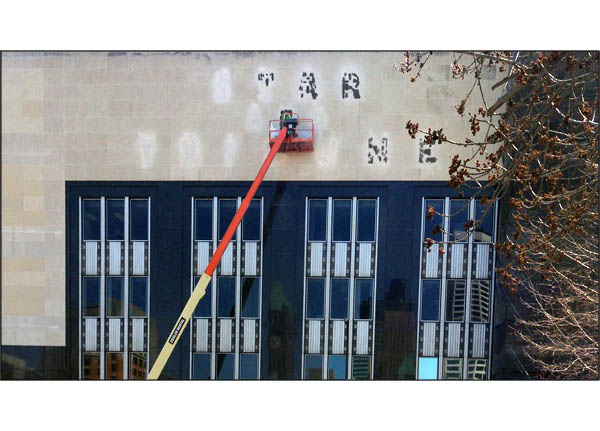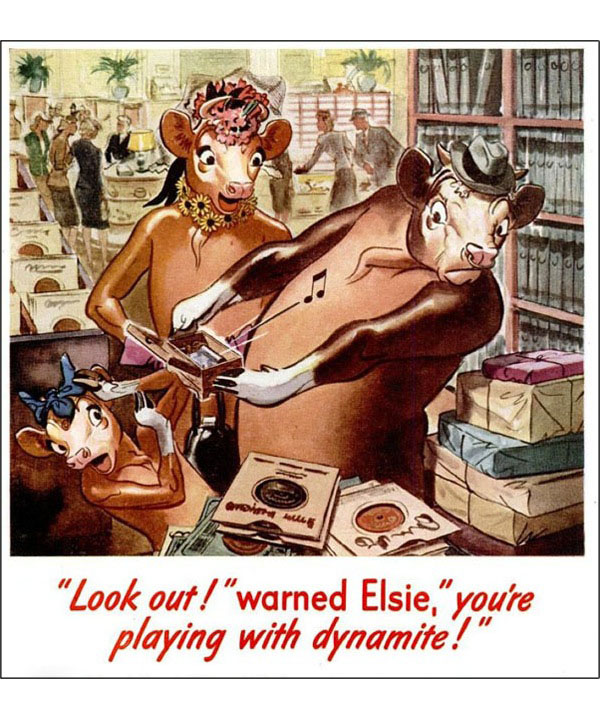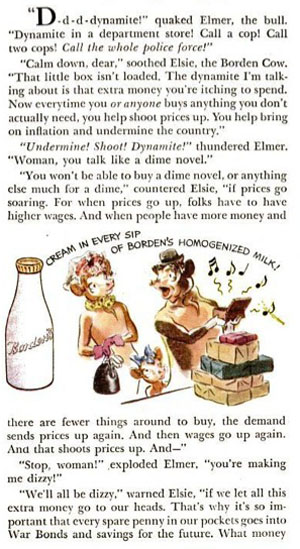|
Apologies today or tomorrow: your choice! Wrote a honking screed tonight, and halfway into it I thought “Huh: I might be on to something here.” Problem: Tuesday night I have an event in the evening, followed by a column due 10 AM Wednesday. No Bleat time. Solution: dump aforementioned Screed in the Bleat for Wednesday, freeing up Tuesday writing time.
So, tomorrow: How half the internet is perpetually infuriated by the failure of humankind to have perfected itself, and why banning certain words and metaphors is absolutely essential to creating a safe, validating space. At this very moment there are words on the internet that are enabling a hostile environment, even for golfers. Whatever shall we do?
So, tomorrow. Today, above the fold, alas: nothing but construction.
Tuesday construction update:

There were men on the skyway outside my window, drilling holes in the roof of the skyway that connects the building to the dead structure across the street. In case you'e not from 'round these here parts, this is what I'm talking about. Third floor, middle grouping of three windows.


Turn left to see the miserable building that will be going down soon to the sorrow of absolutely no one.
Something else I saw going into work: they took the letters off the facade last week. Today, this:

End result:

I have no idea what they're doing. Highlighting the space where the letters were so people know it's the Star Tribune building? It's not exactly a well-kept secret. Everyone knows where we are.
That will change, of course.




Our weekly look at the look of other weeks. The commercial culture, examples low and high, mean and great.
The weekly Borden: Elmer is confused, and rightly so:

 |
Is this some saboteur’s trick to cripple milk production by assassinating the bovine-American community’s most beloved production exhorter? No: Elmer’s impulse purchase might trigger an inflationary spiral.
This time you have to side with Elmer; she really does go on and on, and there’s just nothing she can’t exaggerate into a matter of life and death. |
FIRESTONE
Mr. and Mrs. America, properly attired for Spring Clean-up:

And what does this have to do with tires? Firestone ran a chain of retail stores that sold all manner of things, from toys to appliances. This ad shows why you could get everything non-edible your life required at Firestone, of all places - and it also has some nifty late 40s product design.

If you’re wondering about the leggy woman, she’s dressed in tartan, with a Scottish bonnet, because: Mac’s, the all-purpose Scottish prefix. The slogan was “Don’t Wax it - Mac’s it!” Which makes you wonder what Mac’s was, since it obviously wasn’t wax. Except that it was. I think.
KODAK
A timely reminder that you can’t have too much film in the spring.

It is difficult to imagine a time in which Kodak might say “whoa there, pal, hold on, I think you’ve got enough film there.” I include this for the packaging and the rare store display, and because Kodak still holds a place in people’s hearts as the company that A) made vacation memories possible, and B) seemed to have fumbled away its name and good will like few other companies, at least not until Apple decides it really wants to make toasters and blenders. In the days when the construction of a big new HQ did not mean the company had peaked and was about to hit rough air, Kodak built a 19-story tower in Rochester, which was the tallest building in town until another spire went up.
The Xerox building.
Man, those guys are snakebit. Well, they’ll always have IBM. Right, guys? Right?

SPUTNIK PANIC
Put in a satellite so you’ll know kids will be smart if they were these shoes, and will not answer to anyone named Ivan, ever.

Plahelth looks like a miserable, unhappy word - the opposite of its intent, which is probably Play-Health. As for Beacon Falls:
Father and son George and Tracy Lewis not only founded a business together, they also had a hand in more than doubling the population of Beacon Falls. As their Beacon Falls Rubber Shoe Company, founded in 1898, grew, so did its need for new workers. With the availability of jobs, the town’s population grew from 623 in 1900 to 1,600 in 1922. More than half of those (942, according to records collected by the late town historian Michael Krenesky) were immigrant factory workers, newly arrived from Europe.
Eventually someone realized “Plahelth” was a bad name, and they came up with something else.
Keds.
MAN-MOUNTAIN DEAN
Meet a forgotten pop-culture standby:
 |
|
He was a few years away from his 1953 check-out in this shot. Born in 1891, he was so huge he got away with enlisting in the Army when he was 14. He went into pro wrestling in the 1920s, which might surprise people who didn’t know they had pro wrestling in the 20s. I didn’t. Plus:
he was invited to take a job in the UK as stunt-double for Charles Laughton in the movie The Private Life of Henry VIII. This would be the beginning of a subsidiary movie career for Dean, who would appear in various roles in twelve other movies, playing himself in five of them. One of the movies in which he portrayed himself was the Joe E. Brown comedy The Gladiator, a 1938 adaptation of Philip Gordon Wylie's 1930 novel Gladiator.
|

His signature move seemed to be throwing people around, then smothering them.

NORCROSS
1963 cards. Ever so ultra-modern:

I have no idea how this one works, though. I mean, look at the card, the reflection - are you sending an empty envelope? What’s printed where?
And what kind of selfish message is that, anyway?
Norcross was founded in 1915 by Arthur and Jane Norcross. The company hit a bad patch after the founder died the late 60s, were sold again and again, ended up at Ziff, were closed down in 1981. Google around and you'll find pre-60s cards, still stuck in the old mode that looks so quaint today. Then they went to the Schmoo-style of design, with wacky typefaces and gags, and I wonder if anyone saved them. The old cards were sweet, if treacly; these were just . . . well, they had that new, edgy humor, that was either in the "put-down" or "sick" style, as the worried cultural observers called them.



Usual usual here and there; see you around.
|